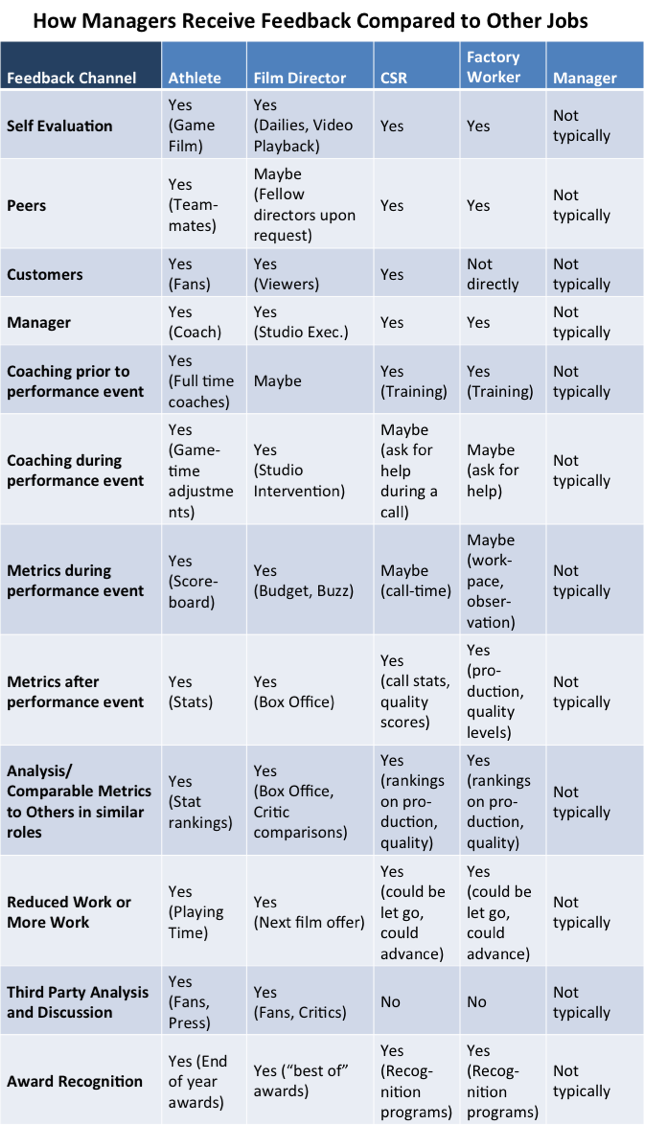Management Design: How managers receive performance feedback compared to other jobs
In my previous articles, I took a look at how high-profile jobs, such as athletes and movie directors, get lots of performance feedback from lots of sources. Then I looked at entry level jobs, and showed how these roles receive tons of performance feedback as well (at least this is the case in high performing organizations). These highly divergent jobs receive tons of performance feedback. Not only do these highly divergent jobs receive a lot of feedback, the quality of the feedback tends to be high, in that the performance feedback is specific and immediate, and allows the person to adjust quickly what they are doing to get better.
OK, so now let’s look at managers. The manager’s job is to manage, hence the name “manager.” So surely managers get lots of feedback, right? No.
In previous articles, I’ve discussed general sources of feedback that managers receive and how incomplete they are. Sources such as 360 degree feedback programs, employee surveys, attrition rates, they tend to be faulty as sources of performance feedback. To underscore this point, let’s compare where managers receive feedback on their job as managers to both high-profile public roles (athletes and movie directors) and entry-level positions (customer service representatives and factory workers).
For the athletes and the movie directors, there is a surplus of performance feedback, some of it sought out, and some of it unsolicited. In fact, entire third party industries have been created to develop and publish statistics and analysis of the statistics for the high profile jobs, and athletes and movie directors have a hard time avoiding this kind of information.
For the entry-level positions, such as CSR and factory worker, there is programmatic feedback built-in via quality programs, real-time stats on production levels, plus post-work quality scores and comparisons to other performers. Recognition programs also exist in some capacity for both kind of jobs.
So even with divergent-type jobs between high-profile and entry-level, the sources of performance feedback are remarkably similar.
But with managers, the story about where performance feedback comes from becomes much more murky, spotty, ad-hoc and random.
It does exist that there are rewards for “best manager”, but how commonplace is this? And how rigorous are the criteria for it?
It does exist that a manager my self-evaluate as a manager, but how frequently do we observe this?
It does exist that a manager receives stats on their team, but how is this tied to the behaviors of the manager?
It does exist that managers receive customer feedback, but the feedback on how they are doing as managers doesn’t come from a customer.
It does exist that a manager of manager gives feedback to the manager on how they manage, but this is the exception, rather than the rule.
In sum, it is atypical that a structured set of means for feedback to managers on how they manage are in place. The emerging field of Management Design needs to solve this issue.
If high-performance athletes need performance feedback to be great at what they do, so do managers.
If entry level workers need performance feedback to be great at what they do, so do managers.
How does your manager receive feedback on being a manager? What channels are available and utilized in your organization?
Related articles:
Entry level jobs receive a lot of performance feedback: What about managers?
One more option for providing feedback to manager: 3rd Party Assessment and Coaching
Employees leaving bad managers – what kind of actionable feedback does this provide the manager?
Can organizations use attrition rates to improve manager performance? It’s tough to do
Using surveys to provide feedback to a manager: How effective is this?
Managers giving managers feedback on managing: How well is this done?
How do employees give feedback to their manager?
How to give feedback to your manager: Some possible openings
How about managers ask for feedback from their employees?
How to ask for feedback from your employees on your management skills (part 1)
How to ask for feedback from your employees on your management skills (part 2)
How to ask for feedback from your employees on your management skills (part 3)
Specific phrases and examples for how to ask for feedback from your employees
